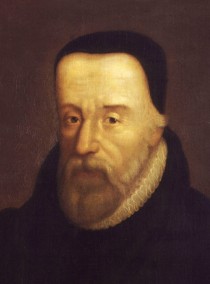
William Tyndale (c. 1492–1536) was born at some time in the period 1484–1496 (Wikipedia; Loane gives 1490-95), possibly in one of the villages of Gloucestershire. He was educated at Magdalen Hall (later Hertford College), Oxford University (BA, 1512; MA, 1515) and attended Cambridge between 1517 and 1521. He was a gifted linguist, over the years becoming fluent in French, Greek, Hebrew, German, Italian, Latin, and Spanish, in addition to his native English.
In about 1521 Tyndale became chaplain to the house of Sir John Walsh at Little Sodbury and tutor to his children. John Foxe (Book of Martyrs) describes an argument with a ‘learned’ but ‘blasphemous’ clergyman, who had asserted to Tyndale that, ‘We had better be without God’s laws than the Pope’s.’ Tyndale responded: ‘I defy the Pope, and all his laws; and if God spares my life, ere many years, I will cause the boy that driveth the plow to know more of the Scriptures than thou dost!’
Tyndale left for London in 1523 to seek permission from Bishop Cuthbert Tunstall to translate the Bible into English, but Tunstall rebuffed him. Tyndale accepted the help of a London merchant and went to Germany in 1524. He never returned to England, but lived a hand-to-mouth existence, dodging the authorities. In 1525, he and his secretary moved to Cologne, Germany and began printing the New Testament. But Tyndale was betrayed, and fled up the Rhine to Worms. Here he started printing again, and the first complete printed New Testament in English appeared in February 1526. Copies began to arrive in England about a month later. In October, Tunstall had all the copies he could trace gathered and burned at St Paul’s Cross in London. Still they circulated. Tunstall arranged to buy them before they left the continent, so that they could be burned in bulk.
Tyndale used the money this brought him for further translation and revision. He began the Old Testament, apparently in Antwerp. Foxe tells how, sailing to Hamburg to print Deuteronomy, he was shipwrecked and lost everything, ‘both money, his copies, and time’, and started all over again, completing the Pentateuch between Easter and December. Back in Antwerp, Tyndale printed it in early January, 1530. Copies were in England by the summer. Revisions and shorter translations followed.
Tyndale’s writings were popular in England. Henry VIII, fearing Tyndale’s influence, sent an ambassador to persuade him to return to England. In a secret, night-time meeting outside Antwerp city walls, Tyndale agreed that he would return to England, if the king would print an English Bible. By the time Henry published his Great Bible, Tyndale was already dead.
In 1535, the fanatical Englishman Henry Phillips betrayed him to the Antwerp authorities and had him kidnapped. He was imprisoned at Vilvoorde, near Brussels, for sixteen months on a charge of heresy. Even Thomas Cromwell, the most powerful man next to King Henry VIII, moved to get him released: but Phillips in Belgium, acting for the papal authorities, blocked all the moves. On the morning of 6 October 1536 (or possibly a few weeks earlier), he was taken to the place of execution, tied to the stake, strangled and burned. His last words reportedly were: ‘Oh Lord, open the King of England’s eyes.’
His dying request seemed to find its fulfillment just two years later with Henry’s authorization of The Great Bible for the Church of England—which was largely Tyndale’s own work. His version also featured prominently in the Geneva Bible which was taken to the New World to Jamestown in 1607, and on the Mayflower in 1620. Notably, in 1611, the 54 independent scholars who created the King James Version drew significantly from Tyndale, as well as from translations that descended from his. One estimate suggests that the New Testament in the King James Version is 83% Tyndale’s, and the Old Testament 76%.
The Trust publishes The Works of William Tyndale in 2 volumes.
[Volume 1 of The Works of William Tyndale contains a ‘Biographical Notice’ of Tyndale. See also the piece on Tyndale in Marcus Loane, Masters of the English Reformation (Banner of Truth, 2005).]